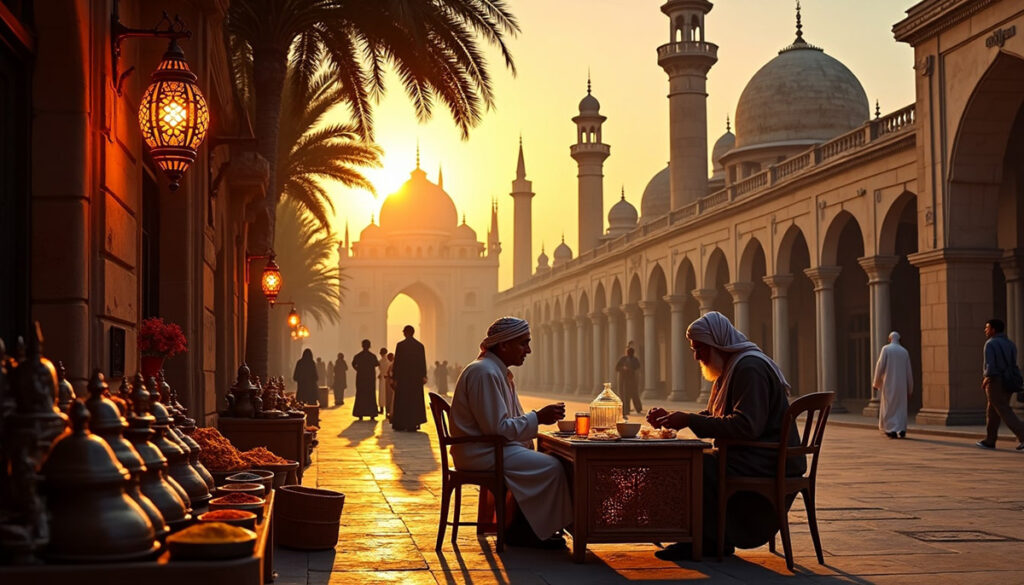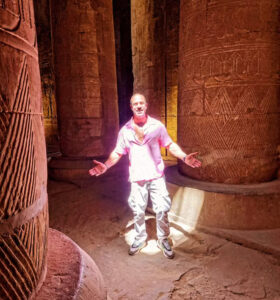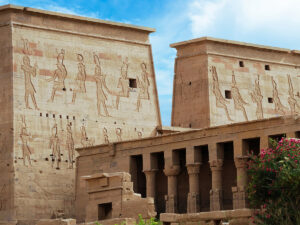Picture yourself wandering through Egypt’s sunlit streets, where ancient traditions blend effortlessly with the hum of modern life. This captivating land offers more than just iconic pyramids and timeless pharaohs; it’s a living, breathing tapestry of culture, customs, and human connection.
To truly experience Egypt, you’ll need more than a camera and a bucket list—you’ll need an understanding of its cultural heart.
Egypt’s cultural charm lies in its warmth, hospitality, and timeless traditions. By embracing these basic customs and norms, you’ll not only navigate the country with ease but also create meaningful connections and unforgettable memories.
So pack your curiosity and an open heart—Egypt is ready to welcome you with open arms.
Here’s a quick list to navigating Egypt like a pro, building connections, and immersing yourself in its way of life.
1. Mastering Greetings
A warm handshake paired with a genuine smile is your ticket to making a great first impression in Egypt. Men typically greet women with a respectful nod unless the woman offers her hand first. Keep these tips in mind:
- Direct eye contact conveys sincerity but may be moderated between genders.
- Expect elaborate greetings—Egyptians love to exchange pleasantries.
- Practice saying “As-salamu alaykum” (“Peace be upon you”) to instantly win hearts.
2. Decoding Hospitality
Egyptian hospitality is legendary, and visiting someone’s home is an experience in itself. Bring a small gift like high-quality sweets, and remember these golden rules:
- Never refuse tea or coffee; it’s a sign of respect to accept at least one cup.
- Compliment your host’s generosity by leaving a small amount of food on your plate.
- Regular visits deepen friendships; long absences might be interpreted as neglect.
3. Navigating Social Norms
Respect and politeness are at the heart of Egyptian interactions.
- Let elders pass first or take the best seat.
- Use your right hand for eating and sharing.
- Avoid overly direct language; Egyptians value subtlety and humor.
4. Exploring Traditional Markets
Egypt’s souks are treasure troves of culture. Iconic spots like Khan El Khalili in Cairo offer everything from intricate jewelry to handmade baskets. Make the most of your market visit:
- Start early to beat the heat and crowds.
- Learn basic Arabic phrases like “Shukran” (thank you) and “Kam?” (how much?).
- Bargain with a smile—it’s part of the fun!
- Carry small bills for easier transactions.
5. Understanding Public Etiquette
Public behavior is guided by modesty and respect. While it’s common for friends of the same gender to hold hands, public displays of affection between couples are discouraged. Keep these tips in mind:
- Dress modestly, especially in religious or rural areas. Egyptian dress codes vary by location, but modesty is appreciated universally. Don’t worry—a veil or hijab is not required.
- Always ask permission before taking someone’s photo.
- Keep small denominations handy for tips, known as “baksheesh.”
6. Savoring Food Culture
Food is more than sustenance in Egypt; it’s a celebration of community. Whether you’re savoring koshari at a street stall or enjoying a home-cooked feast, remember:
- Meals are shared experiences; use your right hand to eat and pass dishes.
- Festival dishes honor heritage and are prepared with premium ingredients.
- Enjoy a cup of Egyptian coffee (ahwa) or tea (shay) as a symbol of connection.
7. Respecting Religious Practices
With a predominantly Muslim population, it’s essential to respect religious customs:
- Dress appropriately when visiting mosques in loose, long clothing.
- Be mindful of prayer times.
- During Ramadan, avoid eating or drinking in public during daylight hours.
8. Tipping with Grace
Tipping, or “baksheesh,” is an integral part of Egyptian culture. Whether at a café, in a taxi, or at a museum, showing appreciation through small tips is both polite and expected.
9. Embracing the Language
A little Arabic goes a long way in building rapport. Common phrases like “Shukran” (“Thank you”) and “Min fadlak” (“Please”) show respect and effort. Egyptians appreciate any attempt to speak their language, no matter how small.





